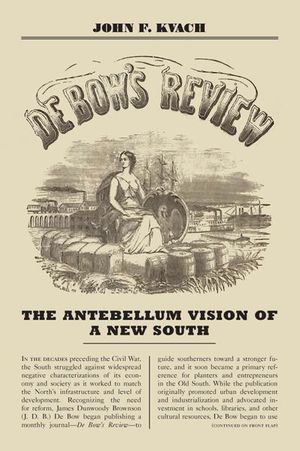De Bow's Review
Published by The University Press of Kentucky
A study of the nineteenth-century magazine from the American South, its editor, and influence on the region.
In the decades preceding the Civil War, the South struggled against widespread negative characterizations of its economy and society as it worked to match the North’s infrastructure and level of development. Recognizing the need for regional reform, James Dunwoody Brownson (J. D. B.) De Bow began to publish a monthly journal?De Bow’s Review?to guide Southerners toward a stronger, more diversified future. His periodical soon became a primary reference for planters and entrepreneurs in the Old South, promoting urban development and industrialization and advocating investment in schools, libraries, and other cultural resources. Later, however, De Bow began to use his journal to manipulate his readers’ political views. Through inflammatory articles, he defended proslavery ideology, encouraged Southern nationalism, and promoted anti-Union sentiment, eventually becoming one of the South’s most notorious fire-eaters.
In De Bow’s Review: The Antebellum Vision of a New South, author John Kvach explores how the editor’s antebellum economic and social policies influenced Southern readers and created the framework for a postwar New South movement. By recreating subscription lists and examining the lives and livelihoods of 1,500 Review readers, Kvach demonstrates how De Bow’s Review influenced a generation and a half of Southerners. This approach allows modern readers to understand the historical context of De Bow’s editorial legacy. Ultimately, De Bow and his antebellum subscribers altered the future of their region by creating the vision of a New South long before the Civil War.
“Kvach fills a surprising gap in the history of the nineteenth-century South with this elegantly written biography of the enigmatic J. D. B. De Bow. The work represents an important contribution to a growing historiography exploring the presence of a middle-class commercial culture in the pre–Civil War South and challenging long-held views of a static socioeconomic world of planters and plain folk.” —Bruce W. Eelman, author of Entrepreneurs in the Southern Upcountry: Commercial Culture in Spartanburg, South Carolina, 1845-1880
“An insightful, original, deeply researched work of scholarship. Examining not only the career of journalist J. D. B. De Bow but also the readers who responded enthusiastically to his call for economic diversification, John F. Kvach helps us see the nineteenth-century South in a new way, undistorted by the stark, artificial line so many historians have drawn to separate the so-called Old South from the New.” —Stephen V. Ash, author of A Massacre in Memphis: The Race Riot That Shook the Nation One Year after the Civil War
“DeBow was the antebellum South’s most prominent advocate of economic modernization and industrialization, and one of its most vitriolic secessionists. John Kvach explores this seeming paradox, and gives us as well a careful description of DeBow’s subscribers and followers.” —J. Mills Thornton, University of Michigan
In the decades preceding the Civil War, the South struggled against widespread negative characterizations of its economy and society as it worked to match the North’s infrastructure and level of development. Recognizing the need for regional reform, James Dunwoody Brownson (J. D. B.) De Bow began to publish a monthly journal?De Bow’s Review?to guide Southerners toward a stronger, more diversified future. His periodical soon became a primary reference for planters and entrepreneurs in the Old South, promoting urban development and industrialization and advocating investment in schools, libraries, and other cultural resources. Later, however, De Bow began to use his journal to manipulate his readers’ political views. Through inflammatory articles, he defended proslavery ideology, encouraged Southern nationalism, and promoted anti-Union sentiment, eventually becoming one of the South’s most notorious fire-eaters.
In De Bow’s Review: The Antebellum Vision of a New South, author John Kvach explores how the editor’s antebellum economic and social policies influenced Southern readers and created the framework for a postwar New South movement. By recreating subscription lists and examining the lives and livelihoods of 1,500 Review readers, Kvach demonstrates how De Bow’s Review influenced a generation and a half of Southerners. This approach allows modern readers to understand the historical context of De Bow’s editorial legacy. Ultimately, De Bow and his antebellum subscribers altered the future of their region by creating the vision of a New South long before the Civil War.
“Kvach fills a surprising gap in the history of the nineteenth-century South with this elegantly written biography of the enigmatic J. D. B. De Bow. The work represents an important contribution to a growing historiography exploring the presence of a middle-class commercial culture in the pre–Civil War South and challenging long-held views of a static socioeconomic world of planters and plain folk.” —Bruce W. Eelman, author of Entrepreneurs in the Southern Upcountry: Commercial Culture in Spartanburg, South Carolina, 1845-1880
“An insightful, original, deeply researched work of scholarship. Examining not only the career of journalist J. D. B. De Bow but also the readers who responded enthusiastically to his call for economic diversification, John F. Kvach helps us see the nineteenth-century South in a new way, undistorted by the stark, artificial line so many historians have drawn to separate the so-called Old South from the New.” —Stephen V. Ash, author of A Massacre in Memphis: The Race Riot That Shook the Nation One Year after the Civil War
“DeBow was the antebellum South’s most prominent advocate of economic modernization and industrialization, and one of its most vitriolic secessionists. John Kvach explores this seeming paradox, and gives us as well a careful description of DeBow’s subscribers and followers.” —J. Mills Thornton, University of Michigan
BUY NOW FROM
COMMUNITY REVIEWS

